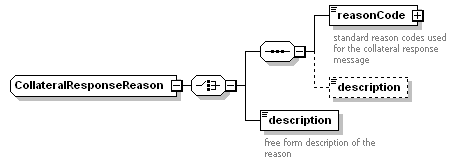
Namespace: |
|
Content: |
complex, 3 elements |
Defined: |
globally in fpml-collateral-processes-5-3.xsd; see XML source |
Includes: |
definitions of 3 elements |
Used: |
at 1 location |

XML Representation Summary |
|||||
| <...> | |||||
|
|||||
| </...> | |||||
| <xsd:complexType name="CollateralResponseReason"> <xsd:choice> <xsd:sequence> </xsd:sequence> </xsd:choice> </xsd:complexType> |
Type: |
xsd:string, predefined, simple content |
| <xsd:element minOccurs="0" name="description" type="xsd:string"/> |
Type: |
xsd:string, predefined, simple content |
| <xsd:element name="description" type="xsd:string"/> |
Type: |
CollateralResponseReasonCode, simple content |
| xsd:normalizedString |
maxLength: |
255 |
| <xsd:element name="reasonCode" type="CollateralResponseReasonCode"/> |
| XML schema documentation generated with DocFlex/XML 1.8.6b2 using DocFlex/XML XSDDoc 2.5.1 template set. All content model diagrams generated by Altova XMLSpy via DocFlex/XML XMLSpy Integration. |